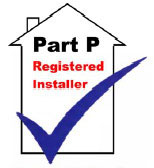
What Is Part P?
Part P is a new part of the Building Regulations which has been introduced by government and affects all electrical work carried out in dwellings. Any electrical work carried out in homes and gardens in England and Wales should follow the rules set out in Part P of the Building Regulations to ensure that they are complying with the law. These rules are designed to ensure that electrical work is safe.
Part P has been introduced to
- reduce the number of deaths, injuries and fires caused by faulty electrical installation
- make life harder for 'cowboys' to leave electrical installations in an unsafe condition
To comply with Part P of the Buliding Regulations all electrical work in dwellings must be designed, installed, inspected and tested to the standard required by BS 7671.
The Legal Requirement
The Building Regulations apply when building work is undertaken. Part P will redefine building work to include electrical work on certain types of fixed electrical installation in dwellings. The new requirement in the Building Regulations, ‘Requirement P', is simply that:
- P1 Design, Installation, Inspection and Testing
Reasonable provision shall be made in the design, installation, inspection and testing of electrical installations in order to protect persons from fire or injury. - P2 Provision Information
Sufficient information shall be provided so that persons wishing to operate, maintain or alter an electrical installation can do so with reasonable safety.
Enforcement
Failure to comply with the requirement is a criminal offence. Local authorities also have the power to require the removal or alteration of work that does not comply with the Building Regulations.
Minor work is electrical work not involving the addition of a new circuit, such as the addition of socket outlets or lighting points to existing circuits and the replacement of accessories. Minor works aren't usually notifiable unless the work is in a Special Location.
Special Locations
- locations containing a bath tub or shower basin
- swimming pools or paddling pools
- hot air saunas
- garden lighting or power installations
- solar photovoltaic power supply systems
- electric floor or ceiling heating systems
- extra-low voltage lighting installations, other than pre-assembled, CE- marked lighting sets
- small scale generators such as micro CHP unit
All electrical installation work in such areas (as well as in kitchens) will need to be notified, or self-certified by a prescribed competent person, even if only 'minor works'.
Building Regulation requirements in addition to Part P
Contractors self-certifying compliance with Part P will also have to certify compliance with other relevant parts of the Building Regulations that have been affected by the electrical work.
For further information, please contact us on 07514 965222 , 01246 220523 or email us directly on enquiries@ntelectrical.co.uk
If you require a complete PAT Testing service then please visit our partners www.spirePAT.co.uk
Just some of the reasons to choose NT Electrical Services
|
Health & Safety Each year, on average, 10 people die and around 750 are injured in accidents involving unsafe electrical installations in the home. In addition to this, 2,336 house fires were caused by faulty installations in 2003. |
Full Certification Full certification is to be provided for all work completed, from a simple socket addition to a house re-wire.The IEE Wiring Regulations is the British standard that covers the safe design, installation and testing of electrical installations in building systems. It is the technical standard specified, almost universally, in UK contracts for electrical installation work. It is also the basis for the approved technical guidance to meet the electrical requirements of the Building Regulations so it is for this reason that a Competent Person will issue you with a BS 7671 certificate on completion of any work. |
|
Highly Competitive Prices Our main aim is to provide a quality service at the best possible price to our customers. 'Discount for charities |
What is Part P? Part P of the Building Regulations was introduced by government in 2005 and affects all electrical work carried out in dwellings. |



